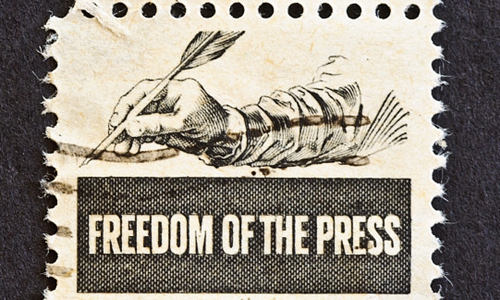
Photo: VCG
I arrived in Washington DC as a correspondent for a Chinese media outlet at the beginning of 2018. I had many expectations of the city before I arrived. There are many think tanks here and you could talk with important figures and hear their thoughts on latest international affairs. It's also the political center of the world's only superpower, and from here I can more closely track and understand the dynamics of its decision-making process that has influence on the world.There was no sign of the coming turbulence in China-US relations then. US President Donald Trump had just visited China not long ago, and the warmth generated by his visit remained in the hearts of many political and business people in the two countries.
When I first arrived in Washington DC, the cherry blossoms were in full bloom near the National Mall. I was impressed by the sights of spring and the enthusiasm and generosity of the US people. I didn't encounter many difficulties when I went to the Foreign Press Centers of the State Department and the press center of Congress to apply for my press credentials.
Then things suddenly began to change. Now I won't even give myself a byline on this story fearing it will make my work even more difficult than it has become.
It started when Trump signed a Memorandum on Actions by the US Related to the Section 301 Investigation on March 22, 2018. The US imposed huge tariffs on a wide range of goods imported from China, and restricted Chinese enterprises from investing and participating in mergers and acquisitions in the US. The move marked the beginning of the China-US trade dispute, and became the biggest obstacle in China-US relations in decades. Since then, Chinese journalists have become one of the most directly targeted groups in the all-round cooling of China-US relations.
Over the past two years, the biggest problem we have faced from the US is obtaining a visa. The US discriminates against journalists from the Chinese mainland by granting only single-entry visas. Journalists from other countries and regions are often given five-year multiple entry visas. If Chinese journalists return home for a vacation, they have to reapply for a visa. American visa officers often make it difficult for them by requiring an administrative review before their visas are renewed, which can take one or two months or even up to a year. There have even been cases of journalists applying for a visa and then not ever receiving a reply. Chinese correspondents assigned to work in the US need to be prepared they may not be allowed to reenter the US if they return to China.
Chinese correspondents are also facing an increasingly hostile reporting environment. The White House Press Office sends real-time press releases to registered reporters' emails every day, but several Chinese journalists have been kicked off the mailing list. Although some reporters were put back on the list after negotiating with the White House, others' requests to be reinstated have not even received a reply.
Continuous sullying by US politicians and media has led the American public to think Chinese correspondents in the US are "spies" and "mouthpieces" of the Chinese government. The US is a country where ideology plays a strong and significant role. With the constant negative reporting on China by US media, many Americans think twice about accepting an interview with a Chinese journalist.
In 2018, many American scholars whose work centers on China were often willing to talk with Chinese journalists over the phone, by email or in person. Since 2019, however, more of these interview requests have been turned down. Interviews are even harder to get with government officials, think tanks or NGOs that have little to do with China.
The US government often complains that American journalists are restricted in China, while Chinese journalists enjoy the freedom of the press in a US open society. But when American politicians constantly tell the American people to be suspicious of Chinese journalists, then the "freedom of the press" we are supposed to be able to enjoy in the US is no more than an allusion.
Media exchanges are an important part of people-to-people and cultural exchanges between countries, as they communicate people's sentiments. Under relentless suppression from American politicians, the living and working environment for Chinese correspondents in the US has drastically deteriorated. While we treat the American people with a kind heart, we face unjustified difficulties, restrictions and rejection by US authorities.
The author is a Chinese correspondent in Washington DC who wished to remain anonymous. opinion@globaltimes.com.cn

